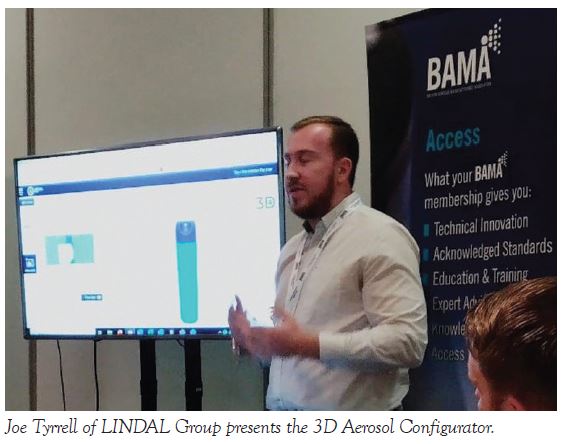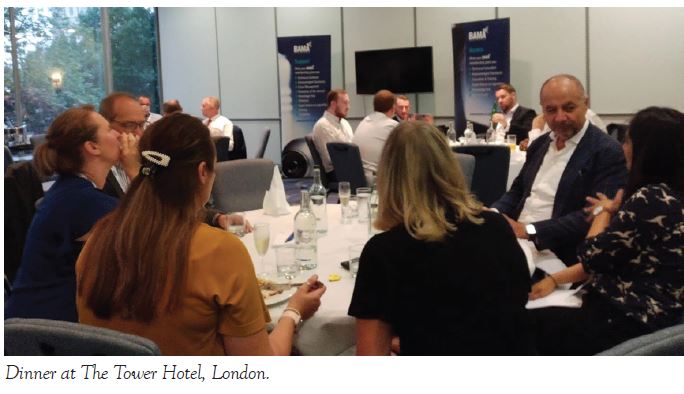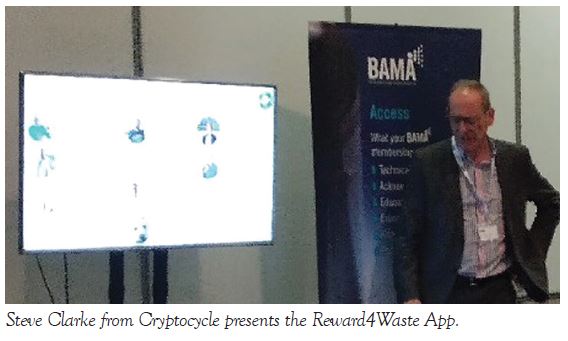Written on: October 1, 2021 by Tiziana Dorigo
The Engineering Employer’s Federation, to which The British Aerosol Manufacturers’ Association (BAMA) is an affiliate partner, has published a report on the first six months of trading for UK manufacturers since the country exited the European Union (EU) at the end of 2020. Following is an extract of some of its key content.
At the beginning of 2021, manufacturers saw the greatest single change in how they trade and do business in the EU and internationally in over 40 years. Businesses were little prepared for the change and the majority experienced significant disruption.
The report does not look at the overall trade volumes, because the overlapping impact of the COVID-19 pandemic would skew the results. It looks mainly at the impact of the changes post-Brexit—the critical disrupting factors, what has improved and what obstacles remain for manufacturers.
The report shows that 96% of manufacturers experienced challenges within the new trading environment. Initially, the struggle was compliance with new customs paperwork and procedures, but this has eased as companies’ familiarity with and understanding of the new processes improved with time.
UK Government statistics for international trade indicate that:
• Total exports of goods increased by £1.3 billion ($1.79 billion) (4.9%) in May 2021, driven by a £1 billion ($1.38 billion) (8%) increase in exports to EU countries.
• Total imports of goods fell by 1.4% in May 2021 because of a 3.4% fall in imports from non-EU countries.
• Monthly goods imports from non-EU countries continue to be higher than those from the EU for the fifth consecutive month, but the gap is narrowing.
While there are reasons for optimism, as some of the processes are becoming routine, some issues still remain. We saw European trade carrying on, after some initial hiccups, but at a higher cost and with longer delivery times. Complying with Rules of Origin requirements to benefit from a tariff-free exchange of goods has proved to be particularly difficult.
Rules of Origin was a condition of the Trade & Cooperation Agreement that emerged only in the final stages, with firms having a limited time to understand the implications for their business operations. This challenge has been significant and will continue to be so, as the increased administration to provide proof of origin becomes a new compliance issue.
Over one-third of UK firms (primarily small- and medium-sized enterprises [SMEs]) are still reporting ongoing challenges with customs. Overall, it has been a mixed experience for the manufacturing sector in the first half of 2021.
The beginning of 2021 also saw new arrangements for UK visitors traveling to the EU on work-related matters. The UK is now a “third country” from an EU point of view and UK employers have to navigate individual EU member state rules for their mobile workforce. Whether a business traveler will need to apply for a visa or not depends on the nature of the business visit and what the traveler will be undertaking in each country. If travelers are considered to be working by undertaking commercial or customer-facing activity, they may need both a visa and a work permit. However, attendance to conferences and symposiums, either as an audience member or as speaker, should be exempt.
The impact of these changes on business travel has yet to be tested, and the true impact will only be appreciated once the COVID-19 restrictions to international movement are fully lifted. With the UK taking back full regulatory autonomy, manufacturers face many new rules that apply to the UK market. In recent years, much of the UK regulatory environment for manufacturers in areas including employment regulation, environmental and climate controls and product legislation had been developed at EU levels with the UK contributing to its design. With the UK’s exit from the EU, these powers have now returned to the British Government and in some cases to the UK devolved administrations (Scotland, Northern Ireland and Wales). The Government will need to decide how it will exercise this sovereignty to the benefit of businesses and consumers in the UK.
There are calls on the Government to help ease ongoing difficulties and work with the EU to seek mutually beneficial improvements to the trading relationship. The new trading environment has ramped up costs, caused import and export delays and is hampering smooth trade as companies struggle to recover from the COVID-19 pandemic.
Key findings of the report include:
• Ninety-six percent of UK companies have struggled to adapt to the new trading environment since the start of the year
• Forty-seven percent had difficulty with customs processes initially; this has improved as companies come to a better understanding of the new rules
• Still, 36% are still struggling with the new customs procedures and paperwork
• Twenty-nine percent say that providing evidence of the origin of their products proves challenging

• There is high uncertainty surrounds business travel, as international travel is only now reopening for business; companies haven’t had the chance to test their understanding of business travel rules for the various EU countries
• Eighty-six percent of manufacturers want Government to work with the EU to ease the difficulties around export processes and customs formalities
• Regulation critical to manufacturers is now solely in the control of UK legislators. The UK Government will decide how this sovereignty is used to benefit manufacturers in the UK. However, many manufacturers favor cooperation or alignment with the EU.
BAMA restarts face-to-face events
On Aug. 19, BAMA resumed its first in-person event after 18 months of COVID-19 restrictions on travelling and gatherings, holding its regional Discussion Evening & Dinner at The Tower Hotel in London.

Based on a combination of business networking and learning, the Discussion Evenings provide a welcome opportunity for the supply chain to meet in a convivial environment, said BAMA. The small scale (25–35 attendees) helps create meaningful interactions and stronger interpersonal relationships, while three after-dinner presentations stimulate discussion and foster new collaborations.
BAMA felt it was impossible to replicate the successful events online once venues shut down and people went into lock-down. The pandemic situation gradually improved with the rollout of the UK vaccination program, but most companies still apply a safety protocol that forbids non-essential travel, even at the domestic level.
Therefore, when BAMA announced that registration to its August 2021 Discussion Evening was open, it did so with a shade of apprehension, fearing not many would show. As it turned out, the request to present an NHS COVID Pass (which lets the holder share COVID-19 vaccination records or test status in a secure way) didn’t stop people from attending.
Joe Tyrrell of LINDAL Group gave a practical demonstration of the 3D Aerosol Configurator, which quickly and easily transforms traditional aerosol packaging decorative processes into sophisticated 3D designs. The tool allows customers to select any of LINDAL’s standard actuators and overcaps with the most commonly used aerosol cans to build more than 5,000 unique aerosol packages. Each 3D model is fully color customizable, allowing branded artwork to be added to the can, to save customers both time and money. Confidential designs are stored on LINDAL’s secure platform.
Steve Clarke, CEO of Cryptocycle, presented an App that uses blockchain technology to track consumer products as they get recycled and provide a reward to the consumer for each item. Users can download the App on their mobile phone and scan the code on their recycling bin before proceeding to scan the items to be disposed. Beyond the incentive for post-consumer recycling, the software can provide detailed geographical data on recycling rates as well as the category of products and frequency of consumption. Users are required to sign in, so data is shared voluntarily and anonymously. Each product code is unique, as with many products in the pharmaceutical industry, so AI prevents consumers going to a store and scanning a whole shelf of codes. The App uses a number of security measures such as geo-location, time lock and till activation.

Bhavina Bharkhada, Head of Policy & Campaigns at MAKE UK, discussed Diversity, Equality & Inclusion in UK Manufacturing. Bharkhada’s presentation noted that diversity of different ethnic origins, physical and mental abilities, gender, sexual orientation, religion, etc. is a key element in creating a welcoming, open environment where people feel they belong. This results in improved effectiveness, less sick leave and overall improved business performance. SPRAY